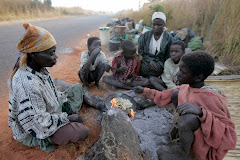Presented to:
Human Rights Council, June 2008 Session
Geneva, Switzerland
30 May 2008We, the Zimbabwean women and women worldwide, urgently call for stopping of violence in Zimbabwe and protection of women and girls, in this post election catastrophe. This is an emergency as the country gears up for a presidential run-off on the 27th of June 2008.The violence persists and is real. No election observers are yet in the country, despite our calls, appeals, cries to Southern Africa Development Community (SADC), African Union (AU) and the United Nations.
We are watching a silent genocide of the poor and powerless, due to political induced murders, criminal actions, and collapse of basic services resulting in deaths due to lack of health care, food, shelter for the displaced, especially after the March 29th, 2008 elections. Most of the affected are women and children.
• The post election murders, burnings, lootings and intimidation have most affected women and girls since its rural targeted and 80% of women live in rural areas.
• Over 800 homes have been burnt down, making it traumatic for mothers who have to feed the children and care for the sick
• Over 10 000 people have fled their homes, are displaced and squatters with relatives and with fear of going back home. Children displaced are not in schools
• Over 50 people have been murdered in cold blood, and mostly from the opposition.
• An estimated 7000 teachers have fled their schools as a number have been beaten in the eyes of parents and pupils.
• Doctors for human Rights report that over 2000 serious cases of physical torture and beatings have passed through their hands and a lot of those they treated have suffered serious fractures to an extent that most are permanently handicapped.
• The oldest victim of the post election violence is an old woman with 12 grandchildren all of them orphaned and whose son is alleged to have campaigned for the opposition.
• The youngest female victim is a 15-year-old girl who was stripped naked together with her pregnant mother forced to lie down and beaten on the breasts and buttocks, just many women have been so battered.
• Several girls and women are feared raped. The youngest child seriously assaulted is only 3 years.
• More than 3,000 Zimbabweans die every weak due to AIDS, and their life expectancy is 34 years for women.
• Unemployment is 80% and inflation is 165 000 % and the highest in the world.
• 95% of women of the 200 000 women made homeless and jobless by the government 2005 Operation Murambatsviina. Women’s church gatherings disrupted, women beaten up and abused while at prayer.
• Over 3 million Zimbabweans are in South Africa where they are facing xenophobic attacks
This situation is an extra-ordinary emergency for women and girls. Every person and institution must do everything in their power to stop the violence, restore rule of law, and allow Zimbabweans to exercise their right to vote and live in peace.
We, as Zimbabwean women and women worldwide:
Re-iterate the long-standing position of Civil Society Organizations (CSOs) that the failure by government and law enforcement, such as police and army to respect the rights of all citizens is the greatest threat to peace, democracy and development in Zimbabwe.
Really concerned by a real danger of civil strife catalyzed by the growing humanitarian crisis. We are witnessing increasing levels of tension and political polarization among the population, which turned out to vote on March 29. The media reports on the party political position adopted by the law enforcement, which should ordinarily maintain neutrality. The recent purchase of military weapons adds to this fear.
Demand cessation of organized and targeted intimidation against the citizens, particularly the use of women and girls as weapons of ‘war’, evidenced by the brutal battering of women’s buttocks, rape and sexual abuse.
Demand the immediate disbanding of the militias, comprised of youths, security agents and one terror group code named Chipangano, which have caused terror and havoc in the rural and urban areas exacerbating the humanitarian situation by creating internal refugees. We demand the disbanding of torture bases where gross abuses of women are taking place including forced labor (cooking and cleaning) and sexual abuse.
Request the Leadership of SADC, the African Union and the United Nations to demand ZANU PF government to stop using violence against its people and TAKE TANGIBLE actions if the violence continues.
Request especially the Human Rights Council to:
I. Establish programme of engagement with Zimbabwe for protection of human rights especially for women, girls and children. The UN must deploy human rights monitors during the run-up to the Presidential Elections.
II. Mandate and support UN Special Rapportuer on Violence Against Women must do a fact-finding mission to Zimbabwe and support the efforts of community, grassroots and other organisations living in a culture of fear, survivors of violence and abuse.
III. Mandate and support UN Special Rapporteur on Human Rights Defenders must put in place ways of ensuring safety and protection for women human rights advocates and activists, who find themselves in fear of life and who ability to engage publicly is compromised.
IV. Engage with Zimbabwe government and authorities and stop the violence, and demand the state to protect ordinary people’s lives.
V. Encourage and support for humanitarian assistance to Zimbabwe, especially in support of food, health and education for rural communities and mostly the displaced.
Organizations and Individuals are encouraged to sign on this statement, and submit to coalition@zol.co.zw (Zimbabwe Women’s Coalition) or worldoffice@worldywca.org; or athenainitiative@gmail.com or dakotareed07@gmail.com



